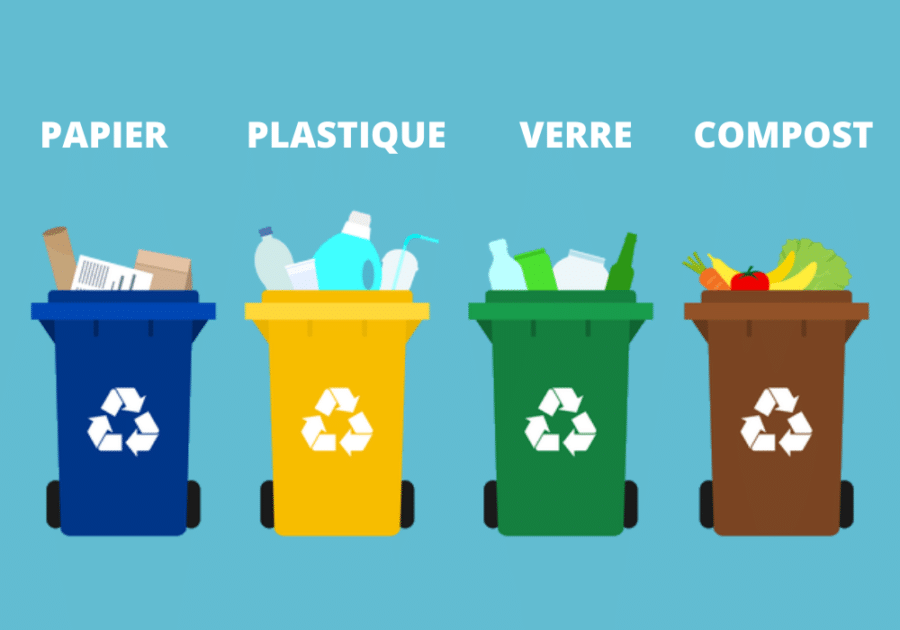France has always been at the forefront of environmental protection, and the country is taking another step forward in 2024 with the introduction of new recycling rules. These rules are designed to reduce waste and increase recycling rates, and they will have a significant impact on households and businesses across the country. Here’s a more detailed overview of the new recycling rules in France in 2024.
Color-Coded System for Recycling
The first major change is the introduction of a new color-coded system for recycling. This will make it easier for people to identify what can be recycled and where it should be placed. All packaging in France will be labeled with a color code that corresponds to the type of material it is made from. For example, green will be used for glass, yellow for plastic, and blue for paper. There will also be a color for metals, such as aluminum and steel. This new system will be mandatory for all companies producing packaging.

Mandatory Separation of Waste
In addition to the new color-coded system, there will also be new rules around how waste is collected. From 2024, all households in France will be required to separate their waste into three categories: recyclables, organic waste, and non-recyclables. This means that materials such as food waste and garden waste will have to be separated from other types of waste. The aim is to make it easier to recycle and to reduce the amount of waste that ends up in landfills.
Recycling for Businesses
Businesses will also be affected by the new recycling rules. From 2024, all businesses in France will be required to recycle their waste. This includes everything from paper and cardboard to plastic and glass. Companies will be required to separate their waste into the same three categories as households: recyclables, organic waste, and non-recyclables. Non-compliance could result in penalties or fines, so it is important for businesses to start preparing now.
Extended Producer Responsibility
Another key change is the introduction of extended producer responsibility. This means that producers of goods will be responsible for the disposal of the packaging that their products come in. This will encourage manufacturers to use more environmentally friendly materials and to reduce the amount of waste generated by their products. Producers will have to pay a fee for the disposal of their packaging.

Incentives for Recycling
Finally, there will be new incentives for recycling. From 2024, households and businesses that recycle will receive financial rewards. This could come in the form of tax credits or reduced waste collection fees. The aim is to encourage more people to recycle and to reduce the amount of waste that ends up in landfills.
The new recycling rules in France in 2024 are a comprehensive plan designed to reduce waste and increase recycling rates. The introduction of a color-coded system, mandatory separation of waste, and extended producer responsibility are just some of the changes that will have a significant impact on households and businesses across the country. It is important for everyone to start preparing now to ensure a smooth transition to the new recycling rules in 2024. By working together, France can continue to lead the way in environmental protection and create a more sustainable future for all.
Schools Collecting Bottle Tops in France: A Creative Way to Encourage Recycling

In France, schools are taking a creative approach to recycling by collecting bottle tops. This initiative not only helps to keep waste out of landfills, but it also teaches children about the importance of recycling and environmental protection.
The collection of bottle tops is an easy and accessible way for schools to promote recycling. Students are encouraged to bring in their own bottle tops from home, as well as to collect them from friends and family. They can be collected in small containers, such as jars or plastic bags, and then brought to a collection point.
Once collected, the bottle tops can be recycled into new products, such as garden furniture, children’s toys, and even prosthetic limbs. This is a great way to show students that even small actions can have a big impact on the environment.
Collecting bottle tops also encourages students to think more carefully about how they dispose of their waste. It promotes a sense of responsibility and encourages them to be more mindful of the impact their actions have on the environment.
In addition to the environmental benefits, collecting bottle tops can also be a fun and engaging activity for students. It is a way to bring the school community together and promote a sense of teamwork and camaraderie.
There are many schools throughout France that are taking part in the bottle top collection initiative. Some schools even run competitions to see who can collect the most bottle tops, which adds an element of friendly competition and encourages students to collect as many as possible.
Schools collecting bottle tops in France is a creative way to encourage recycling and promote environmental protection. It teaches students about the importance of recycling and encourages them to be more mindful of their waste. With more schools taking part in this initiative, it is likely that we will see a continued increase in recycling rates and a reduction in waste in landfills.






